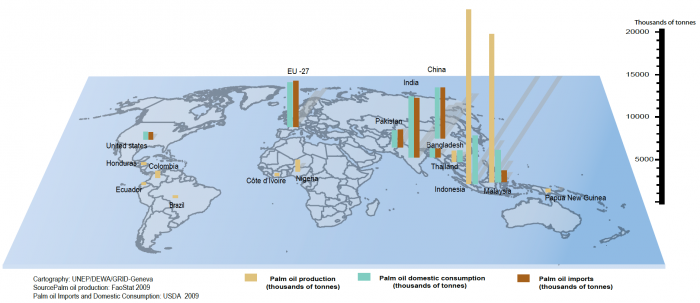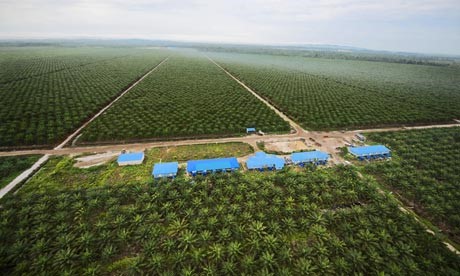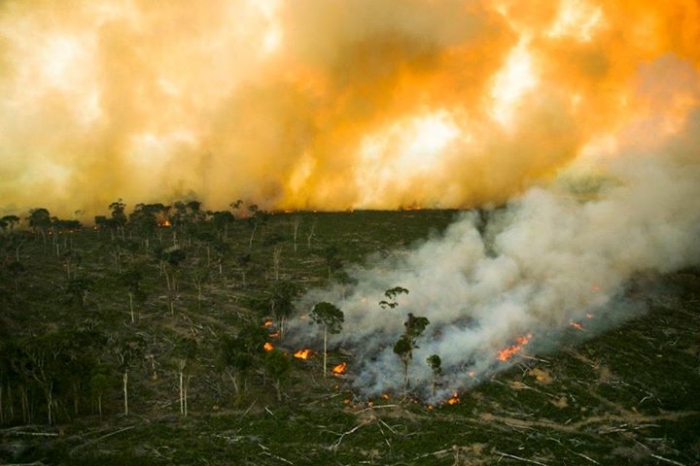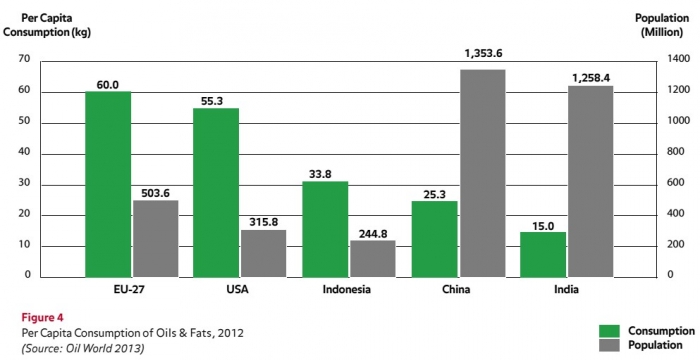Industry and plantation of palm oil in Borneo, Indonesia,is continuing to cause controversy. After displacing and destroying forests and the ecosystems, now the industry of palm oil began to displace resident land. Quoted on tempo.com on 27th of January[1], the expansion of palm oil plantation has displaced 75% of land residents that causing residents lost their homes and their lands. This is facilitated by the absence of a certificate of land by citizens, which makes the residents lands become easier evicted by the company. Whereas the uncertifcate land is customary land which is doesn’t have a certificate. This land evictions was related to Presidential Instruction No. 6 of 2013 which is about the protection of primary forests and peatlands, forcing employers to think a ‘dirty strategy’ to attack the resident fields. It’s depressing and worrying, isn’t? Employers seems like don’t have a feelingonly for the sake of oil fields. The question is, how much benefit from the oil industry they got? And how bad the impact of the presence of the oil industry in Borneo?
Palm oil industry is themost effective oilseedindustry. From 1 hectare of palm oil plantations, it could produce 10 times oil more than other oilseed industry, and the efficient industry could produce 8 tons per one hectare.Beside it, palm oil industry also has a very broad consumer which covers 150 countries, with only 10 major palm oil industry including Indonesian.[2] The main consumers of palm oil is, Europe, China, India, and Malaysia with total level of consumption reached 52.1 tons in 2012. And currently the USA also started to switch from soybean oil to palm oil with a high percentage ratio, thus will add great new customers for palm oil.[3]
Currently, Indonesia is the first ranked country as the world's palm oil exporter that is a total of 9 million hectares of the 13 million hectares of oil palm plantations that exist over the world, or about 75% of world palm oilseed plantations.[4] One of the main sources of palm oil in Indonesia is from Borneo. In 2013, Borneo has 1,115,415 hectares of palm oil plantations and able to produce 7,600,298 tons of CPO (crude palm oil) per year.[2]The expansion of palm oilplantations is expected to continue to grow by 9% per year.[5]From that fact we could conclude that the palm oil industry is a profitable industry. No wonder if the palm oil industry becomes the main source of foreign exchange for Indonesia. Also, people said the presence of palm oil industry also provide a lot of new job opportunities for the Borneo’s people and optimize the untapped land in Borneo. But, was the statement is true accordance to the reality?

Although palm oil industry is claimed profitable, but there’s also a lot of negative impact ofthe palm oil industry presence, including:[6]
- Causing damage to ecosystems because of land clearing by burning the forest, and after plantation it leaving bare soil and can not be planted again.
- Causing damage to forest ecosystems due to monoculture.
- Causing exhaustion of water sources, because the palm trees can absorb a lot of water.
- Causing damage to soil nutrient sources and contamination of water sources near the plantations and the palm oil industry, due to the waste oil generated.
- Social conflicts as a result of the seizure of territory to be used as an oil palm plantation.

And the mostpathetic factis 50% ownership of the palm oil industry in Indonesia is a foreign-owned like Malaysia, Singapore, the US, UK, Belgium, and by 52% of CPO from the palm oil industry in Indonesia is also intended for export.[7] Then the main question is, still we and should we torture our land, our people, our forests, which is like ‘our own mother’ onlyfor the purpose of foreign needs? Looking to this fact, does our palm oil industry still at a profitable position or are we being tricked by other countries? Moreover, the mostour current exports are in the CPO form (crude palm oil), which islowestadded value product and stillcan be processed in other countries, so other countries get more benefit by adding value .
If we looks at the fact that in Indonesia there are 9 million hectares of the 13 million hectares of oil palm plantation in the world, it should be a big question for us, why only Indonesia which has oil fields up to 75% percent of them. We are sure the agriculture condition in Indonesia is not main the reason, because many other countries has the same conditions like Indonesian agriculture condition. The answer is may not all countries are ready to accept the consequences if they has oil industry in their country, and they considered a greater lossthan the benefits. So that why other countries may decide to import from Indonesia or become a investor.

So far until now, the negative effects that have been described above still doesn’t have the solution. Government efforts to prevent the opening of new land of palm oil, always can be tricked by a rogue oil palm company. Like a Presidential Instruction No. 6 of 2013 about the primary forests and peatlands protection, can be tricked with a land eviction of residents. Regulation of the Minister of Agriculture No. 98 of 2013, which it limits the maximum palm plantation ownership of 100 thousand hectares per group of companies, can be tricked by pass ownership of the plantation to a third person as a local farmer who is remains a member of the group of companies. We can see there is always a way to outsmart government regulations.
For this case, in my opinion, the government needs to be firm and concern toclearing the destruction of Borneo problem. Some solution mayinclude:
- The government needs start thinking about a substitution for palm oil replacement, such as soybean oil. Where to produce the soybean oil does not sacrifice a large area such as palm oil. Soybean oil is the number two after the oil palm that has a large market share in the world that has the same function as well as palm oil.
- Until now the bare soilin borneo was left and not taken care of either by governmental or private. The government should start thinking about restoration and revitalitation of the soil, either doing research or exploit for any other type of farming that restore soil nutrients.
- Giving permission to the company to open a new land, but olny after the companies had done the the environment responsibility to restore the damaged environment. And also conduct a comprehensive assessment before giving permission for better land use.
- Restrict foreign investment and expanding investment for the local specially for locaal farmers, with a 20%percentage of exports and 80% for domestic consumption, with that percentage the expected destruction of the environment for opening of new land will be much lower.
- Establish rules for exporting palm oil is not in the CPO form, but must in the form of the final product, ie, such as cooking oil, soap, margarine, biodiesel, etc. Besides increasing the value of exports, that solution will causing lot of palm oil industry will be established in Borneo, and it will open new bussiness and jobs for the people in Borneo.
- Increase the oil export tax, so it will reduce exports abroad and add more foreign exchange.
- Limit and mark the area that can be used as an oil field and as a protected area, where the protected area include home and community land, so that residents are not displaced by land opening palm plantation. Palm companyalso will be forced seek barren land to be restorated to use and invest in substitution of palm oil.
- Perform a mozaic planting pattern, so that the forest or land is not a monoculture and can be occupied by a variety of ecosystems.
The main conlcusion is, boththe government and the palm oilindustry in Indonesia, especially in Borneo should be careful and concern to response environmental damage. Every rule that has been set by goverment for palm oil industry should be an indicator for palm oil industry to realize that thenature destructionis near, and not just outsmart these rules. If both the government and employers are not aware of that,then the whole land Borneo will damaged and can not be replanted, allanimalsandplantswill lose their ecosystem, people will lose their land and residence. The people of this nation will suffer only for the other nations needs.
“Only when the last tree has been cut down, The last river been poisoned, And the last fish been caught, We will realise we cannot eat money”
Bibliography
[1]
J. Wuysang, “Riset: Kebun Sawit Gusur 75 Persen Lahan Warga,” Kompas, 2015. [Online]. Available: http://www.tempo.co/read/news/2015/01/27/090638002/Riset-Kebun-Sawit-Gusur-75-Persen-Lahan-Warga.. [Diakses 20 3 2015].
[2]
Anonymous, Palm Oil Facts and Figures, Sime Darby Plantation, 2014.
[3]









